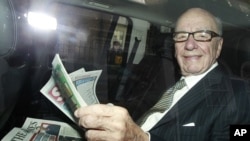U.S.-based News Corp. is at the center of a phone-hacking scandal in Britain that is having serious business and legal implications for the media giant. There is increased scrutiny in the United States of News Corp. and its chairman, Rupert Murdoch.
Allegations that the U.S.-based News Corp. violated British law may have legal consequences for the company in the United States. Several U.S. senators and Republican Congressman Peter King have called for an investigation to determine if the company violated any American laws. Attorney General Eric Holder, the Securities and Exchange Commission and the Federal Bureau of Investigation have responded with preliminary inquiries.
Jay Fahy, a former federal prosecutor and criminal defense attorney, explains relevant laws.
“On the criminal side, from what we know, it’s the Foreign Corrupt Practices Act and perhaps some privacy violations, or mail fraud or wire fraud as to breaking into cell phone records," said Fahy. "There may also be bribery if cell phone companies were somehow given money.”
News Corp. is alleged to have bribed British police to get information for stories run in its tabloid News of the World. The Foreign Corrupt Practices Act extends a U.S. prohibition against bribery to include U.S. companies operating abroad. Former News of the World editor Andy Coulson, who once served as a spokesman for British Prime Minister David Cameron, has been arrested in the case, which involves not only the possible tapping of cell phones in Britain, but of 9/11 victims in the United States.
News Corp. has also suffered multi-billion-dollar business losses. The media giant was forced to scuttle plans to buy a controlling share of the lucrative British Sky Broadcasting, Britain’s biggest satellite broadcaster.
Felix Gillette, a reporter for Bloomberg Businessweek, says the scandal has also pummeled the company’s stock.
“They’ve lost on paper more than $5 billion," said Gilette. "I think shareholders are nervous about what this means for the future of the whole company."
News Corp. chairman Rupert Murdoch, an Australian by birth, acquired U.S. citizenship to be eligible for media ownership in the United States. His assets include a Hollywood studio and the Fox television network, which is particularly influential among American conservatives.
Murdoch has been criticized for consolidating media, depriving the public of diverse viewpoints needed to make informed decisions in a democratic society. Among the critics is Dean Starkman, a fellow at the Columbia Journalism Review.
“This moment, with the scandal in the U.K., it has the potential to radically change the media landscape both here in the U.S. and around the world," said Starkman.
Starkman says the phone-hacking scandal could give smaller media organizations an opportunity to challenge the power that News Corp. has acquired. That power includes 27 broadcasting licenses in the United States issued by the Federal Communications Commission. Jay Fahy says the FCC could refuse to renew those licenses.
“If the FCC took a hard line on this, and it is proven that Murdoch knew of it, or his son knew of it, or very high level people in the company knew of it, this could cause them to lose those licenses, and if those licenses are lost, that’s the end of his empire," he said.
Fox News has made little mention of the scandal and did not respond to VOA’s request for an interview. Rupert Murdoch told The Wall Street Journal, which he owns, that he is creating an independent committee to investigate allegations of possibly illegal reporting tactics that have shaken his company.




